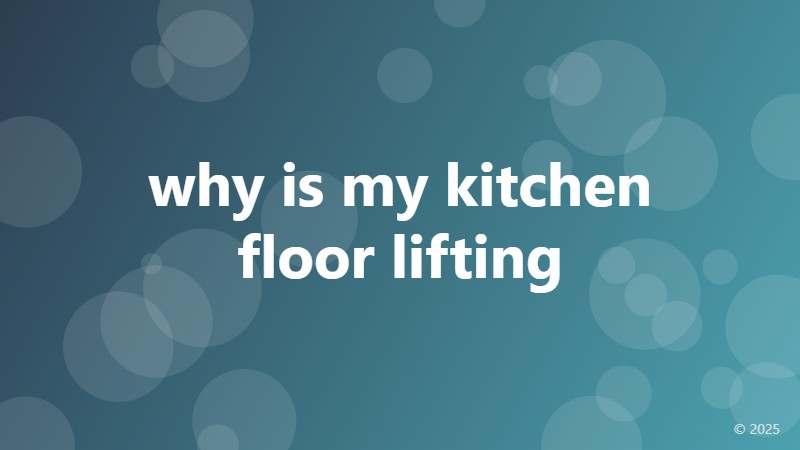why is my kitchen floor lifting

Identifying the Culprits: Common Causes of a Lifting Kitchen Floor
Are you frustrated with a kitchen floor that's slowly but surely lifting off the ground? You're not alone. A lifting kitchen floor can be a real nuisance, not to mention a potential safety hazard. But before you can fix the problem, you need to identify the underlying cause. In this article, we'll explore some of the most common reasons why your kitchen floor might be lifting and what you can do about it.
Water Damage: The Silent Culprit
One of the most common causes of a lifting kitchen floor is water damage. Whether it's a leaky pipe, a faulty dishwasher, or a spill that wasn't cleaned up promptly, water can seep into the floor's substrate and cause it to lift. Check for signs of water damage such as warping, discoloration, or musty odors. If you suspect water damage, it's essential to address the issue promptly to prevent further damage.
Poor Installation: A Recipe for Disaster
A poorly installed kitchen floor is another common cause of lifting. If the floor wasn't installed correctly, it can lead to unevenness, cracks, and eventually, lifting. Check if the floor was installed over an uneven subfloor or if the adhesive used was of poor quality. In some cases, a poorly installed floor may need to be replaced entirely.
Settling Foundation: A Natural Phenomenon
In some cases, a lifting kitchen floor can be caused by a settling foundation. As a house settles over time, the foundation can shift, causing the floor to lift. This is especially common in newer homes or those built on unstable soil. While it may not be possible to prevent a settling foundation, you can take steps to mitigate its effects, such as installing a sturdy subfloor and ensuring the floor is properly secured.
High Humidity: The Sneaky Culprit
High humidity in the kitchen can also cause a floor to lift. When the air is too humid, it can cause the flooring material to expand and contract, leading to lifting. Check if your kitchen is prone to high humidity and take steps to reduce it, such as installing a dehumidifier or improving ventilation.
What to Do Next: Fixing a Lifting Kitchen Floor
Once you've identified the cause of your lifting kitchen floor, it's time to take action. Depending on the severity of the problem, you may need to call in a professional to assess and fix the issue. In some cases, a simple repair may be all that's needed, while in others, a full replacement may be necessary. Whatever the solution, it's essential to address the problem promptly to prevent further damage and ensure your kitchen floor remains safe and functional.